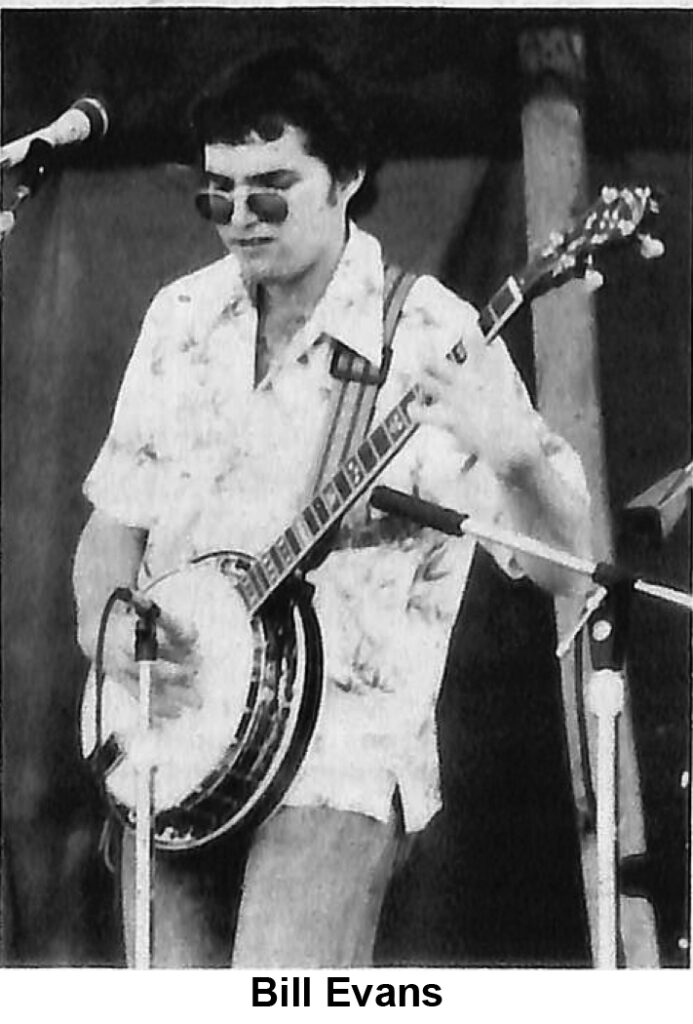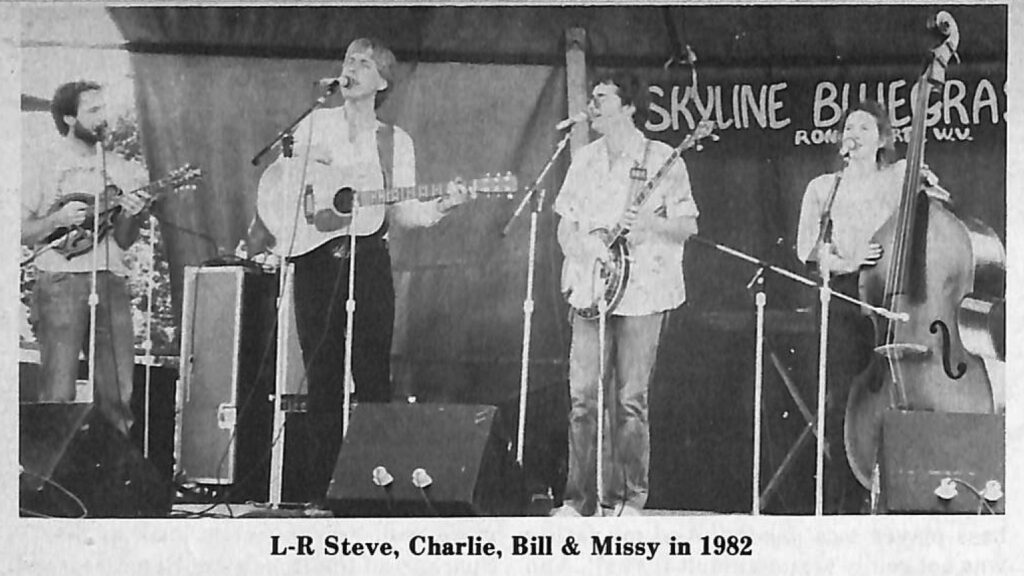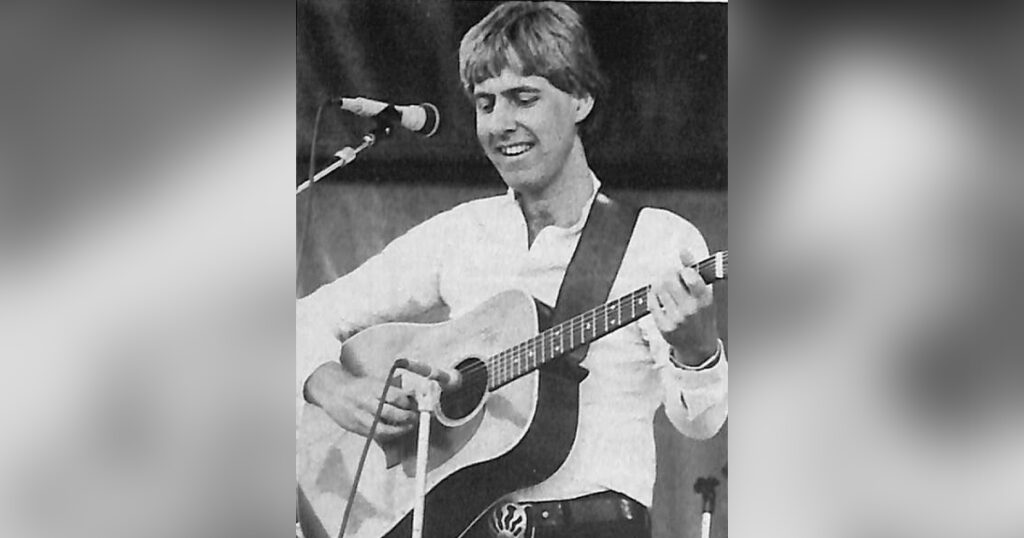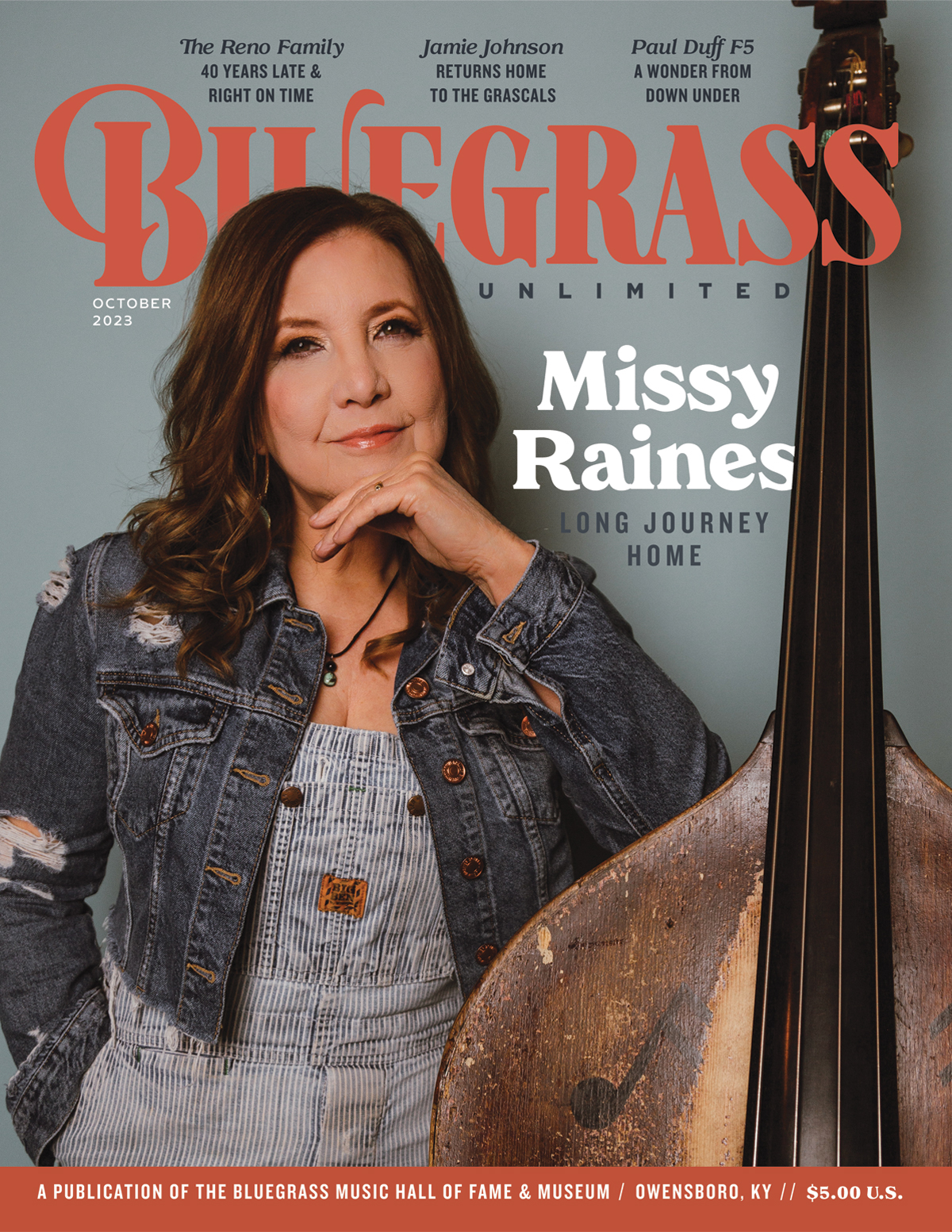Home > Articles > The Archives > Cloud Valley—The Right Combination
Cloud Valley—The Right Combination
Reprinted from Bluegrass Unlimited Magazine
August 1983, Volume 18, Number 2
When is a bluegrass band not a band but an “ensemble”? What is the difference? Some people may think that “ensemble” is only a fancy name for a group —a word used in publicity material sent out to secure the more elite gigs like colleges or concert halls. But if these people would listen to Cloud Valley, a young, refreshing group from Charlottesville, Virginia, the difference would be clear. “Band” does not adequately describe this intricate combination of talented young people creating a bright new sound in bluegrass. Cloud Valley is truly a bluegrass ensemble in the sense that many diverse parts have been successfully unified into a stunning whole effect.
How does a group of bluegrass musicians come together and click like this, after years of searching for the right combination? Obviously, there must be a strong shared belief in the way bluegrass should be played and often this belief is an unspoken, underlying feeling tying a group of diversified talents together. Cloud Valley possesses a very clear idea of what bluegrass means. It is interesting to look at some of the common elements that brought and keeps this group together.
Cloud Valley was started by Bill Evans as a part-time band in August of 1979. Bill has been a professional musician since graduating from the University of Virginia in 1978. He played with the Falls City Ramblers and later with Charlie Moore and the Dixie Partners. After a few stints with some other bands that “didn’t pan out very well,” he decided to do solo acts and teach music. Being a versatile musician, proficient on banjo, hammer dulcimer, as well as guitar, Bill was able to earn a living as a musician on his own. But eventually he realized he needed to go back to a band format so that he could play his main instrument—the banjo. So Bill tried once more to play with a bluegrass band, this time putting the group together himself.
When asked what Bill was looking for, in going from band to band after college, he hesitates, then grins. “Rent Money!” The whole group laughs with a knowing “been there” smile. Bill gets serious. “Actually, that’s not true … after I decided to make music a career I spent an intensive two or three year period learning from others, trying to familiarize myself with as many different kinds of music as I could and using these different band vehicles to learn not only musically what it’s all about but also the demands of the lifestyle of the professional musician.”

Charlie Rancke joined Bill in September of 1979 to start Cloud Valley along with Joe Briggs on bass and Jack Cowardin, from a Washington D.C. group, Coup De Grass, on mandolin and fiddle. Charlie started in music during elementary school in Long Island, New York. He played clarinet, then later guitar, and insists that he “hated it, hated it! I quit. Then right about that time the folk boom hit really big and I got back in. Some neighbors of mine played and were just a couple of steps above me. I think that’s what every young musician really needs is someone around that he or she can look up to. But that person can’t be so far advanced that they could say ‘I won’t play with you anymore because you’re not good enough.’ I was fortunate enough to have just the right circumstance.”
While attending James Madison University in Harrisonburg, Virginia, Charlie performed with the Hankey Mountain Express, a part-time group from the Shenandoah Valley. Upon graduating from college in 1978, Charlie left the group to become a professional musician. Charlie stuck with the guitar, developing a personal, folksy lead style to fit bluegrass rhythm and energy, when he joined Bill Evans.
In 1981 the band decided to perform full-time and had to make some personnel changes. According to Bill, their goals as a bluegrass group were beginning to crystalize, and they needed “people who were willing to take a chance; to put in work and effort to take a band that was more or less totally unknown and create something that could be viable.”
Steve Smith joined Cloud Valley in May of 1981. Steve started out playing traditional bluegrass on banjo with a band called Mountain Air. He met Bill while working at Busch Gardens in Virginia where Bill was playing with his college band, The Modern Grass Quartet. During this time Steve was not only searching for the right sound and the right band, he still had not found his right instrument. It was necessity that pushed him away from the banjo; there were too many banjo players in his area and it seemed that more bands needed mandolin players. He wanted to play with a band, so he made the practical decision to take up the mandolin. It was the right move.
“It’s a much more interesting instrument to me. Personally, I can relate to the instrument better. I feel more freedom with it. I was very tied down on the banjo. I couldn’t exercise my imagination. I could play Earl Scruggs on the banjo but that was it, I couldn’t play anything else. I just didn’t have any way of developing it.”
Steve played for three years with the Nothin’ Doin’ Band and recorded with them on the Outlet label. However, his full creativity and improvisational mandolin work didn’t blossom until he came together with Cloud Valley. Like Bill, Steve is writing original instrumentals as well as vocal numbers, for the group.

In August of 1981, Missy Raines came to Cloud Valley, to complete the present combination. And like the others, she also came from a background of much professional music playing, experimenting with different instruments and “doing time” with some successful well known groups, before coming into her own with Cloud Valley. Around West Virginia, where Missy was born, she has been known for a long time as an astounding bass player, and in the bluegrass world in general her name is usually included with today’s top bass players. However, she started out on guitar and her ambitions were to be a guitar player. Like Steve, she found her “true” instrument by trying to fill a need. One day her father brought home a bass in hopes of learning to play it. Missy picked it up and promptly dropped the guitar. “I was playing with people who had never played with a bass player before so a bass player was needed. And my father was not really serious about it at all. And I was thinking more and more in terms of playing in a band and they needed a bass player.”
Missy played with several well known bands in the West Virginia and D.C. area while she was in high school. Then in her senior year she played with a Washington D.C. band, Stars and Bars, and recorded an EP with them. After graduation, she went to Greensboro, N.C., to play with Jimmy Arnold in an attempt to settle in with an established, professional band, but lost out on that promising job. That led to stints with more well known bands such as Larry Sparks and the Lonesome Ramblers, and Cherokee Rose. When she came to the just-forming Cloud Valley, she was looking for other musicians with a solid bluegrass background who were attempting to go beyond what most other bluegrass bands were doing.
Missy explains that her long impressive list of the numerous bands she has performed with is a result of looking for a band she could fit in with. “First I wanted someone who had already established themselves. Then I realized that wasn’t necessarily what I needed. What I needed was to be with people who wanted to make a go of it. And I hadn’t found that. I had walked into a lot of bands that had already established the sound they wanted. What I wanted to find was a band that wanted to work together full-time and make a go of it.”
Using the lessons of the past as a constructive learning tool, the individual members of the group continued their search for that unique combination of like-minded musicians at a similar stage of musical development, ready to create a new sound. Having found just such a combination, this only half explains Cloud Valley’s striking, sophisticated sound. The other half of this success story is that Missy, Steve, Charlie and Bill all possess the same love for traditional bluegrass, while yearning to tie together their own contemporary musical roots within the bluegrass medium.
“We like many different kinds of music,” Bill explains. “We all come from a bluegrass background in that we all spent a number of years —and in many ways are still learning—how to create within the traditional bluegrass form. But we also listen to all kinds of other music ranging from black gospel music to Sons of the Pioneers to be-bop, avant-garde, classical music and new wave music. I think there is an unspoken rule between the four of us that if we try to play a traditional bluegrass song we like to keep it fairly traditional—do it our way, but keep it traditional. So if we’re doing a swing tune, play it as if it’s a swing tune. If you’re playing a be-bop jazz tune, try to make it sound as much like modern jazz as you possibly can. If you’re doing a black gospel tune try to make it sound as authentic as you can. You may have to change the function of the instruments, perhaps use different vocal harmonies in the ensemble sound. So in that sense, I think we’re real preservationists. But to listen to us with all these different kinds of music that we play, we might seem eclectic and progressive. But I don’t know if we really think of ourselves as that.”
This is the challenge that keeps Cloud Valley’s enthusiasm and energy going, and keeps their sound original. How can a bluegrass band play jazz, swing, ragtime, black gospel, cowboy, and old-time music, integrating such a wide range of styles without sacrificing the essential quality that keeps it bluegrass? And how can a band play such a smorgasbord of sounds without losing their own unique style, without sounding like a bluegrass band trying to play cowboy songs?

Charlie answers, “I see it as a result of all the different stylistic influences we have absorbed. We all come from a bluegrass background. However my background was steeped in lots of different kinds of music and I think that all of us as youngsters listened to the Beatles, a lot of pop music, top 40 type music, country music, whatever. Also singing in church, high school, and taking general music courses in public schools creates a lot of different spheres of influences that you can come under. We also approach music from a written and theoretical standpoint, perhaps more than many traditional musicians, enabling us to borrow from each other and our different instruments and the ranges and capabilities they have. Fortunately we all have different vocal ranges as well so we can do some four-part things which a lot of bands don’t do.”
Not only does having good vocal combinations, being able to approach music theoretically, and coming from an incredibly wide range of influences help lift a band to an “ensemble” sound, but stressing originality helps too, as Missy explains, “I think it’s just something we would all do anyway. When we all started playing together it was in the backs of our minds that we did not want to be in a band that spent their time copying other bands and doing someone else’s version of something. I spent a long time in very many bands that have done that.”
Bill adds, “Much more important than having rules about what to do is to just take great care in what we do. In other words, we take a song and try to put as much into it as we possibly can, making the song new by thinking out exactly what we want to do with it. And in some cases it takes three to four months of intensive playing of one song before it comes together. But I think that’s the roost important thing—taking great care with each song no matter where it comes from —whether we’ve written it ourselves or whether it’s traditonal bluegrass or swing or popular music. It’s looking at a song for a very long time and determining what we want to say through a song and how we want to utilize the resources and talents of the people in the ensemble.”
Cloud Valley works hard. They practice fifteen to twenty hours, and play. three to five gigs a week. The hard work paid off in September of 1982 when the group won second place honors in the Kentucky Fried Chicken Best New Bluegrass Band Contest, held in Louisville, Kentucky. Earlier that summer, the band recorded its first album, “Cloud Valley, A Bluegrass Ensemble,” on the Outlet record label. Released in January of 1983, the record mirrors the versatility of the group with some fine original tunes, including an original a cappella gospel song, “Fishers of Men,” and some vintage, overlooked songs. Guest musicians include Mike Auldridge on eight-string Dobro and Bob Spates on violin.
With a characteristic sense of right timing and readiness, Cloud Valley made its decision to record with a “musically conscious feeling that you’re ready to do it.” But, Bill goes on to describe a business side to knowing when you’re ready to do an album. They reached a point where they “really weren’t able to break into a wider sphere—unless you have a record to precede you. These days and times people aren’t willing to go out and hear a group that they haven’t heard before.”
With the release of their first album, Cloud Valley may no longer have to rely on inadequate labels such as progressive or modern, for the record proves that a fresh, “new” approach is at hand. Actually, what the group is doing is the same thing that the bluegrass masters of the forties and fifties did: simply exploring, being expansive and original without losing a unified vocal and instrumental sound.
Bill summarizes the problem of being considered “progressive” when you’re actually doing bluegrass the way it’s traditionally been done, by pointing out that the term progressive has been overused in describing bands that simply copy popular tunes. “I think we’ve all grown to dislike that element of progressive bluegrass. In the end everyone loses because creativity is squelched. We have an unwritten rule that we just simply don’t do a song if it’s associated with another band because when you’re trying to do this as a living, and you’re totally committed, you realize that you are really making that commitment to yourself, to each other and to the music, and that you have to search within yourself and come up with a music that is you. You have to speak through the music. If you’re simply grafting, taking a song and turning it into a bluegrass song, it’s not really saying a lot.”
Cloud Valley: four young serious professionals who have found their musical voices and are excited about exploring the creative possibilities within their own bluegrass ensemble.

